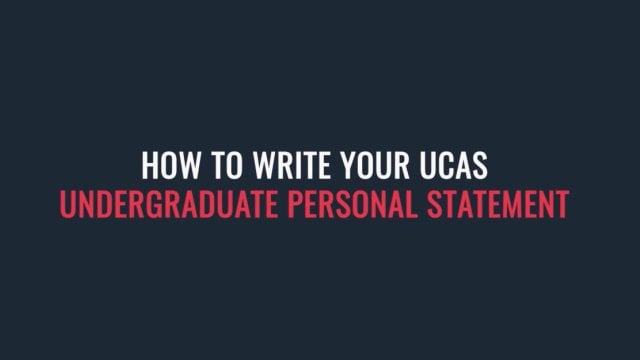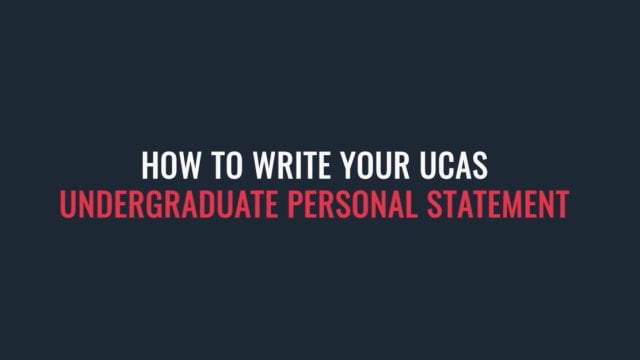What’s a personal statement?
An undergraduate personal statement is a chance to get noticed for the unique talents and experiences you have. It’s an important part of the application process as it’s an opportunity to talk about yourself and your passions, outside of your grades.
In this article, we’re going to talk you through how to write an undergraduate personal statement that stands out, without leaving you feeling overwhelmed.

Preparing to write your personal statement
You’ll have heard the saying preparation is key, and that’s no different when you’re tackling your personal statement. There are two things to think about when you’re planning. The practical and factual information you need to get across, and the more emotional, human parts of you that make you different to everyone else.
Before you start writing, take some time to think about the key things you’d want an admissions tutor to know about you, and get them down on paper. Don’t worry too much about making your notes perfect – this is more about making sure you know why you should be offered a place.
You can also look at the course description as this’ll help you with what to include and give you a good idea of what each uni is looking for.
Here are a few questions you can answer to help you get started:
- Why have you chosen this course?
- What excites you about the subject?
- Is my previous or current study relevant to the course?
- Have you got any work experience that might help you?
- What life experiences have you had that you could talk about?
- What achievements are you proud of?
- What skills do you have that make you perfect for the course?
- What plans and ambitions do you have for your future career?
How to open your personal statement
Admissions Tutors will be reading a lot of personal statements so it’s important to grab their attention right from the start.
Remember, it can only be 4,000 characters, which is about two sides of A4. So, you’ll need to use your words wisely to fit everything in.
You can find a full guide on How to start a personal statement: the attention grabber, but here are the main things to think about.
- Don’t overthink the opening. Just start by showing your enthusiasm for the subject, showcasing your knowledge and understanding, and sharing your ambitions of what you want to achieve.
- Avoid cliches! Remember, this opening part is simply about introducing yourself, so let the admissions tutor reading your personal statement get to know you.
- Keep it relevant and simple. You’re limited on how much you can include so avoid long-winded explanations. Why use 20 words when 10 can make your point?
Your personal skills and achievements
Next, you’ll need to write about your personal skills and achievements. Universities like to know the abilities you have that’ll help you on the course, or generally with life at university.
Don’t forget to include evidence to back up why you’re so excited about the course(s) you’ve chosen.
- Be bold and talk about the achievements you’re proud of.
- Include positions of responsibility you hold, or have held, both in and out of school.
- What are the things that make you interesting, special, or unique?
Your work experience and future plans are important to include. You should share details of jobs, placements, work experience, or voluntary work, particularly if it's relevant to your course.
Try to link any experience to skills or qualities that’ll make you successful.
If you know what you’d like to do after as a career, explain how you plan to use the knowledge and experience that you’ll gain to launch your career.

Work experience and future plans
Your work experience and future plans are important to include. You should share details of jobs, placements, work experience, or voluntary work, particularly if it's relevant to your course.
- Try to link any experience to skills or qualities that’ll make you successful.
- If you know what you’d like to do after as a career, explain how you plan to use the knowledge and experience that you’ll gain to launch your career.
How to end your personal statement
It’s always good to connect the beginning of your statement to the end and a great way to reinforce what you said at the start.
You want to see the ending as your chance to finish in a way that’ll make the admissions tutor remember you.
This final part of your personal statement should emphasise the great points you’ve already made and answer the question of why you should be offered a place on the course.
Read our full guide on How to finish your statement the right way.
Don’t be tempted to copy or share your statement
UCAS scans all personal statements through a similarity detection system to compare them with previous statements.
Any similarity greater than 30% will be flagged and we'll inform the universities and colleges to which you have applied.
Find out more
Summary
Now you’ve written your undergraduate personal statement, you’ll need to do a couple of final things before you submit it.
- Have you proofread it?
Don’t just rely on spellcheckers. We’d recommend reading it out loud as that’s a great way to spot any errors as well as checking it sounds like you.
- Have you asked for feedback?
Ask friends, family or a careers advisor to have a read through your personal statement and take their feedback on board.
Want more advice on your personal statement? Use the links below.
More advice
Use the UCAS’ personal statement tool alongside this guide to help you structure your ideas.
Are you interested in how you can turn you Personal Statement into your CV? Read our advice here